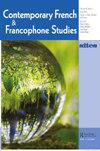从Paul valery(“找出作者提出的问题”)到michael Ferrier的阅读
IF 0.2
4区 文学
0 LITERATURE, ROMANCE
引用次数: 0
摘要
摘要本文考虑了valsamry的假设(Cahiers, 1923),即批评家应该有意识或无意识地发现作者所经历的“问题”,并决定是否成功地解决了这个问题。三年后,valsamry补充说,因此,评论家应该把注意力集中在作品本身,并试图通过仔细阅读来破译它的所有含义(Cahiers, 1926)。作者费里尔本人也是一位经验丰富的评论家,他通过采访和与读者的多次交流,为读者提供了许多阅读线索。然而,这样的做法有可能使批评家的努力付诸东流,使他们变成鹦鹉学舌,不如他们的主人好,而且可能无法提供新的观点。此外,评论家的另一个陷阱是把他们自己的阅读问题当作作者可能有过的问题。唯一的解决办法是拒绝“新批评”所谴责的“情感谬误”,并考虑作者,叙述者,语境和评论家之间的文本。这篇文章讨论了法语、肖像画和拼字游戏。一名高级军官。结语部分简要地考察了瓦尔杰里对小说的消极态度,想知道如果他面对格利桑特或费里尔的诗歌小说,他会有什么反应。关键词:valemassry ferrier近读情感谬误valemassry scrabble注1 Mes pracry决策斜体威廉·库尔兹·温萨特和门罗·比尔兹利合著的《意图谬误》和《情感谬误》。《读者-反应理论》,沃尔夫冈·伊瑟尔、斯坦利·菲什、罗兰·巴特、沃尔特·斯拉托夫、诺曼·霍兰德合著。D 'Edward W. Said,《世界、文本与批评家》,特别是《même》第一章我重复ici一个表达式utilisee几个次par爱德华Glissant在ses essais ou il看到莱斯技术叙述德威廉·福克纳知道le«绕道»等le«均依照ainsi»,la愿景d 'identites morcelees。Michael Wiedorn, Hugues Azerad和Celia Britton的《美国克里奥尔人:讲法语的加勒比地区和美国南部》中心乐器,Ferrier samudiera钢琴。我将与matrise sur les chansons de Georges Brassens进行交流;加上获得的薪金和薪金,将会减少薪金和薪金的变化。Il consacra sa th本文章由计算机程序翻译,如有差异,请以英文原文为准。
De Paul Valéry (« découvrir quel problème l’auteur s’est posé ») à une lecture de Michaël Ferrier
AbstractThis article considers Valéry’s postulation (Cahiers, 1923) that critics should work on discovering the « problem » experienced by the author consciously or unconsciously and decide whether it was successfully resolved. Three years later, Valéry added that critics should therefore concentrate their attention on the work itself and try to decipher all its meanings through close reading (Cahiers, 1926). Through interviews and multiple exchanges with readers, Ferrier, the author, himself a seasoned critic, provides many reading clues. Such practices, however, threaten to kill critics’ efforts by turning them into parrots, less good than their master, and perhaps kept away from offering new perspectives. Also, another trap for critics is to take their own reading problems for those the writer might have had. The only solution is to reject the « affective fallacy » denounced by The New Critics, and to consider texts between author, narrator, contexts and critic. This article deals with François, portrait d’un absent, and Scrabble. Une enfance tchadienne. The conclusion briefly examines Valéry’s negative attitude towards novels, wondering what his reactions might have been, if confronted, for instance, with Glissant’s or Ferrier’s poetic novels.Keywords: ValéryFerrierclose readingaffective fallacyFrançoisScrabble Notes1 Mes précisions en italiques.2 Voir les deux essais écrits par William Kurtz Wimsatt et Monroe Beardsley, « The Intentional Fallacy » et « The Affective Fallacy. » Parmi les critiques adonnés à la « Reader-Response Theory, » on compte Wolfgang Iser, Stanley Fish, Roland Barthes, Walter Slatoff, Norman Holland. D’Edward W. Said, voir The World, the Text and the Critic, en particulier le premier chapitre du même titre.3 Je reprends ici une expression utilisée plusieurs fois par Édouard Glissant dans ses essais où il commente les techniques narratives de William Faulkner, à savoir le « détour » et le « différé, » ainsi que la vision d’identités morcelées. Voir les articles de Michael Wiedorn, Hugues Azerad et Celia Britton dans American Creoles: The Francophone Caribbean and the American South.4 Photo choisie par Martin Munro pour la couverture de son livre traduit.5 Entre autres instruments, Ferrier étudiera le piano. Il écrivit sa Maîtrise sur les chansons de Georges Brassens; plus généralement, il aime les chansons françaises et autres. Il consacra sa thèse de doctorat à la Chanson chez Céline, thèse qui devint un livre: Céline et la chanson.Additional informationNotes on contributorsBernadette CaillerBernadette Cailler is professor emerita at the University of Florida. She received degrees from the Universities of Poitiers, Paris, and Cornell (PhD in Comparative Literature, 1974). A member of the African Lliterature Association from 1975 to 2015 and of the International Council for Francophone Studies from its foundation (1987–2022), she received the 1999 Maurice Cagnon Prize (now I.C.F.S. Prize) for her contributions. She has published books (and articles) on Aimé Césaire (1976) and Édouard Glissant (1988), articles on other French-writing authors, and is the author of Carthage ou la flamme du brasier. Mémoire et échos chez Virgile, Senghor, Mellah, Ghachem, Augustin, Ammi, Broch, et Glissant (2007). She is currently working on Michaël Ferrier and Lorand Gaspar.
求助全文
通过发布文献求助,成功后即可免费获取论文全文。
去求助
来源期刊

Contemporary French and Francophone Studies
LITERATURE, ROMANCE-
CiteScore
0.30
自引率
0.00%
发文量
43
期刊介绍:
An established journal of reference inviting all critical approaches on the latest debates and issues in the field, Contemporary French & Francophone Studies (formerly known as SITES) provides a forum not only for academics, but for novelists, poets, artists, journalists, and filmmakers as well. In addition to its focus on French and Francophone studies, one of the journal"s primary objectives is to reflect the interdisciplinary direction taken by the field and by the humanities and the arts in general. CF&FS is published five times per year, with four issues devoted to particular themes, and a fifth issue, “The Open Issue” welcoming non-thematic contributions.
 求助内容:
求助内容: 应助结果提醒方式:
应助结果提醒方式:


